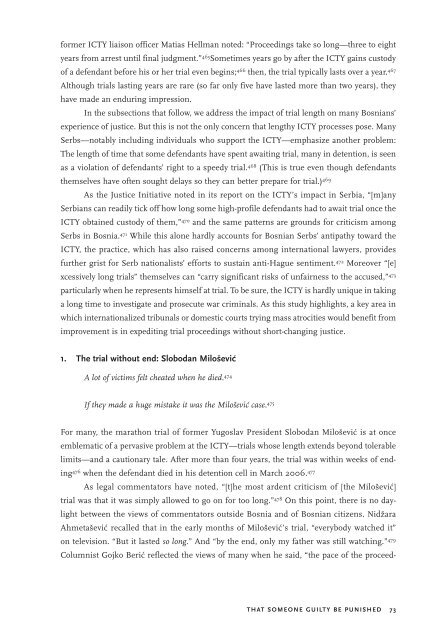That Someone Guilty Be Punished - International Center for ...
That Someone Guilty Be Punished - International Center for ...
That Someone Guilty Be Punished - International Center for ...
You also want an ePaper? Increase the reach of your titles
YUMPU automatically turns print PDFs into web optimized ePapers that Google loves.
<strong>for</strong>mer ICTY liaison officer Matias Hellman noted: “Proceedings take so long—three to eight<br />
years from arrest until final judgment.” 465Sometimes years go by after the ICTY gains custody<br />
of a defendant be<strong>for</strong>e his or her trial even begins; 466 then, the trial typically lasts over a year. 467<br />
Although trials lasting years are rare (so far only five have lasted more than two years), they<br />
have made an enduring impression.<br />
In the subsections that follow, we address the impact of trial length on many Bosnians’<br />
experience of justice. But this is not the only concern that lengthy ICTY processes pose. Many<br />
Serbs—notably including individuals who support the ICTY—emphasize another problem:<br />
The length of time that some defendants have spent awaiting trial, many in detention, is seen<br />
as a violation of defendants’ right to a speedy trial. 468 (This is true even though defendants<br />
themselves have often sought delays so they can better prepare <strong>for</strong> trial.) 469<br />
As the Justice Initiative noted in its report on the ICTY’s impact in Serbia, “[m]any<br />
Serbians can readily tick off how long some high-profile defendants had to await trial once the<br />
ICTY obtained custody of them,” 470 and the same patterns are grounds <strong>for</strong> criticism among<br />
Serbs in Bosnia. 471 While this alone hardly accounts <strong>for</strong> Bosnian Serbs’ antipathy toward the<br />
ICTY, the practice, which has also raised concerns among international lawyers, provides<br />
further grist <strong>for</strong> Serb nationalists’ ef<strong>for</strong>ts to sustain anti-Hague sentiment. 472 Moreover “[e]<br />
xcessively long trials” themselves can “carry significant risks of unfairness to the accused,” 473<br />
particularly when he represents himself at trial. To be sure, the ICTY is hardly unique in taking<br />
a long time to investigate and prosecute war criminals. As this study highlights, a key area in<br />
which internationalized tribunals or domestic courts trying mass atrocities would benefit from<br />
improvement is in expediting trial proceedings without short-changing justice.<br />
1. The trial without end: Slobodan Milošević<br />
A lot of victims felt cheated when he died. 474<br />
If they made a huge mistake it was the Milošević case. 475<br />
For many, the marathon trial of <strong>for</strong>mer Yugoslav President Slobodan Milošević is at once<br />
emblematic of a pervasive problem at the ICTY—trials whose length extends beyond tolerable<br />
limits—and a cautionary tale. After more than four years, the trial was within weeks of ending476<br />
when the defendant died in his detention cell in March 2006. 477<br />
As legal commentators have noted, “[t]he most ardent criticism of [the Milošević]<br />
trial was that it was simply allowed to go on <strong>for</strong> too long.” 478 On this point, there is no daylight<br />
between the views of commentators outside Bosnia and of Bosnian citizens. Nidžara<br />
Ahmetašević recalled that in the early months of Milošević’s trial, “everybody watched it”<br />
on television. “But it lasted so long.” And “by the end, only my father was still watching.” 479<br />
Columnist Gojko <strong>Be</strong>rić reflected the views of many when he said, “the pace of the proceed-<br />
THAT SOMEONE GUILTY BE PUNISHED 73

















